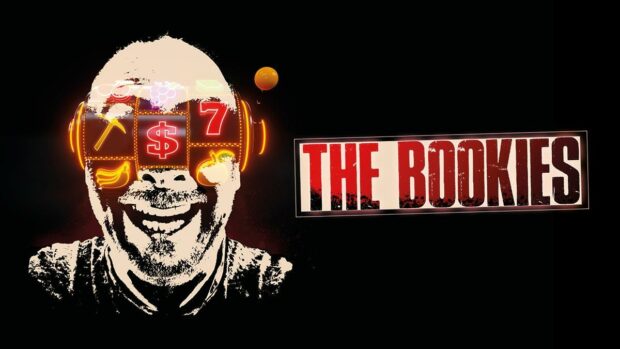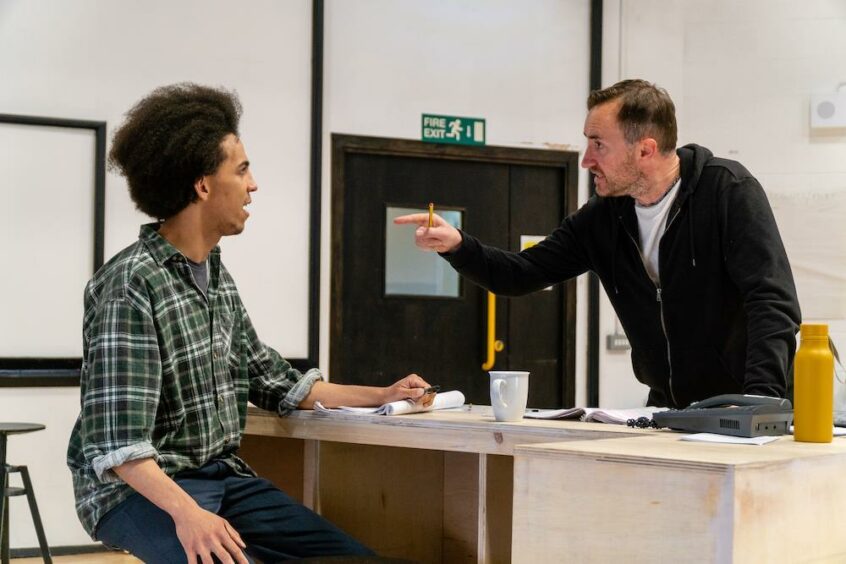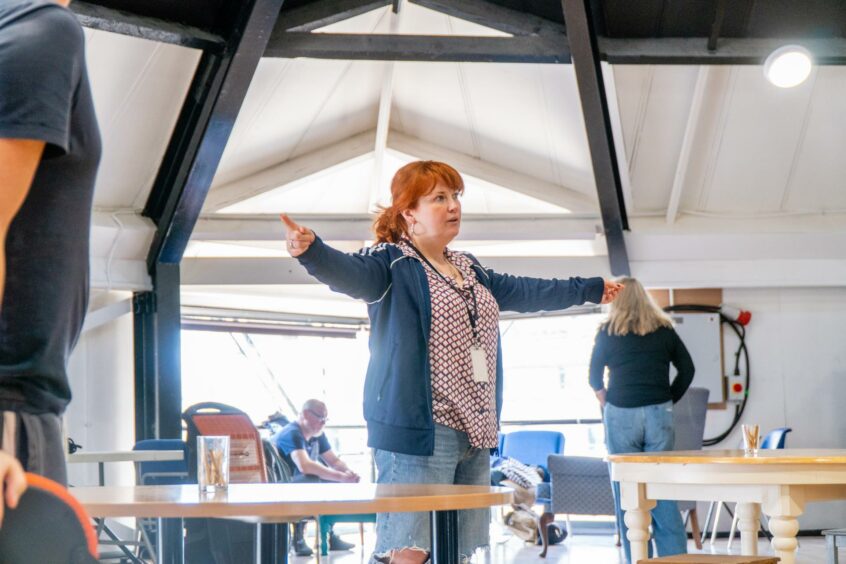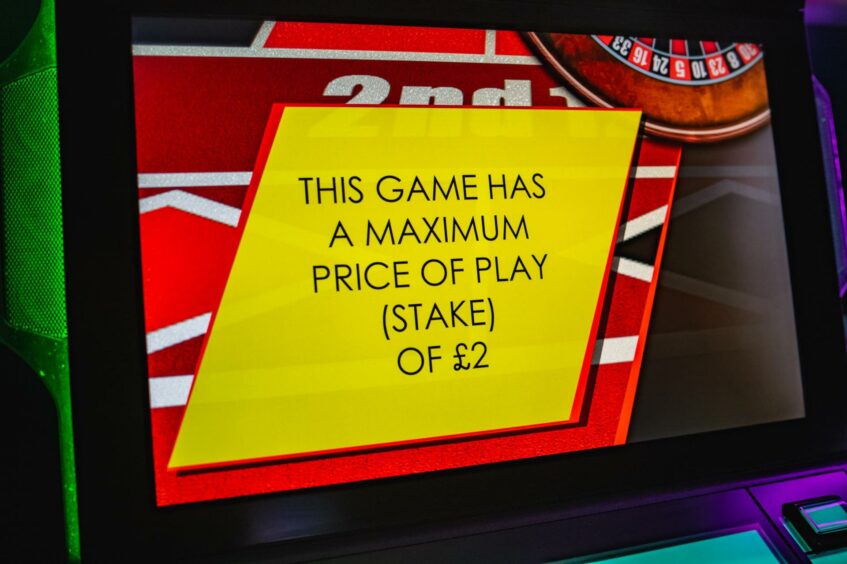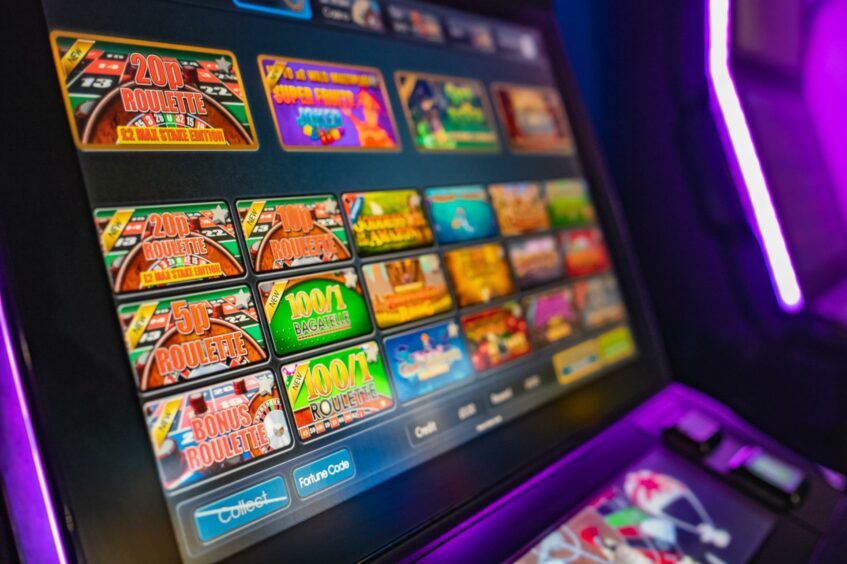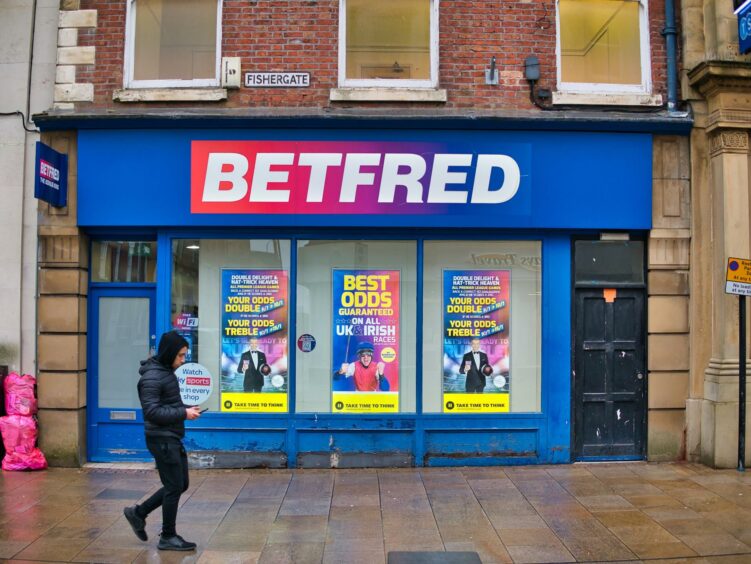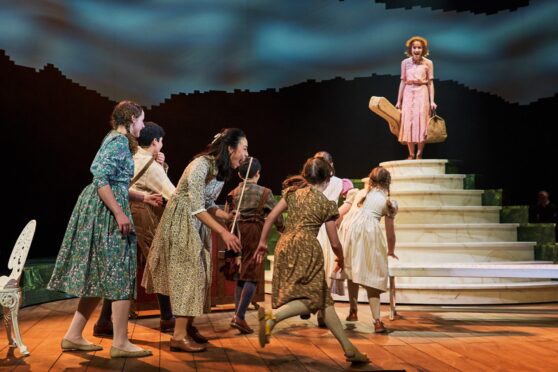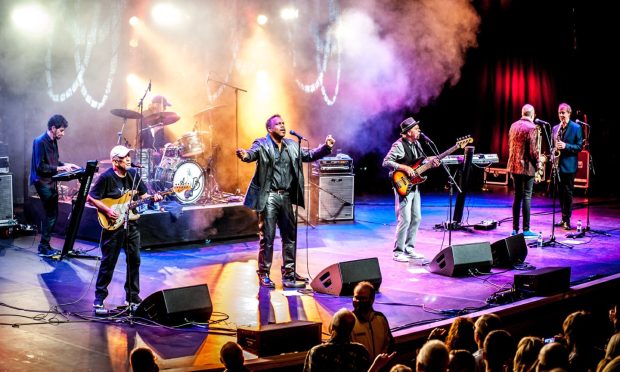“The bookies is high street retail, but it’s unique,” says Michael Burnett, co-writer of this month’s new play from Dundee Rep Theatre, The Bookies.
As someone who’s worked within the gambling industry for a high street bookmaker for 20 years, alongside his playwrighting career, he’s got a personal stake – pun intended – in the play’s subject.
“The things that go on in the bookies, you would never see in Sainsbury’s,” he continues.
It’s a different wold
“We get all walks of life, we really do. Rich, poor, male, female, all ethnicities, it doesn’t matter who you are.
“You can have some fantastic relationships with customers – I’ve got pals, really nice people, who come in. But another unique thing about the bookies is, we deal with con men, so you’ve constantly got to be on guard.
“You would never walk into a Sainsbury’s and see a member of staff saying, f*** off, you p****, but you could see that in a bookie’s. That’s no exaggeration.
“But it can also be a social setting, a club for old folk. It’s a very unique environment. I get on well with a lot of customers, other customers I can’t stand.”
Working class writers
Burnett wrote the play with his writing partner Joe McCann, with whom he’s previously created work for the Edinburgh Fringe and on attachment to the Traverse Theatre.
Both are working class writers – Burnett’s from Edinburgh, McCann’s from Glasgow – who studied at the University of Bedfordshire together.
“We were surprised that no one’s written a story set in the world of the bookie’s,” says McCann, who recently created the verbatim piece Things My White Friends Say, about racism in Scotland, for the Tron Theatre in Glasgow.
He’s currently working on a play set in Hungary, where he lived for many years, working in IT and writing journalism.
“There have been no TV shows, no plays… so we thought we’d give it a go.”
They first came up with the idea 15 years ago, while they were at university.
“It was originally a TV pilot,” says McCann. “We sent it to our lecturer at uni and he loved it, but he said there’s too much swearing – too many ‘c’ words!
“Then we sent it to an agent, and I don’t know why, but she loved it, and she sent it into the Comedy Unit (in Glasgow).
“They liked it, but they agreed with our teacher, it just wasn’t going to get on the BBC how it was. So we put it away, then last year we decided to give it another go.”
Then the odds shortened
When they started thinking about the story again, Burnett mentioned it to a friend – who just happened to be the playwright of Black Watch and Gagarin Way, Gregory Burke.
“Greg said, as long as it’s about FOBT machine addiction,” says Burnett, referring to the Fixed Odds Betting Terminals which are a feature of high street betting shops.
“We were already going to do something about that, so this gave us the confidence to approach a theatre like the Rep, and thankfully (artistic director) Andrew Panton liked it. It’s a world I know, and Joe knows it through me.”
McCann takes up the story. “Andrew said, this sounds like a great story, leave it with me.
“Two weeks later we got commissioned, and that was last April, we’ve been working on it since then. It must have gone through close to a hundred drafts.
“He paired us with Douglas Maxwell as dramaturg, he had a lot of input on the script, and then Sally (Reid, director) came on board and she’s been amazing.”
The play is a four-hander, explains Burnett, starring Rep regulars Irene Macdougall, Barrie Hunter, Ewan Donald and Benjamin Osugo.
“The main character is Pat, he’s the shop manager, he’s resentful of all his customers, but at the same time he’s a bit of a jobsworth.
“It’s a dark comedy set in a bookie’s, and there’s a lot happening in it – it’s about addiction and a lot of other things.”
The character palette
“There are a lot of themes,” explains McCann. “Addiction, tortured masculinity, racism, misogyny… there’s plenty going on with it. Pat’s the main character, then there’s a guy called John, a young black guy who’s just had a racial reawakening.
“He’s trying to sort out his life and figure out what he’s going to do with himself. Then we have Harry, he’s addicted to the FOBT machine, so he spends most of his days in the shop, and Michelle is the area manager.
“She’s had a wee bit of history with Pat and he likes to throw it in her face. She’s got a lot of things going on with her life.”
The ‘fob’ machines
The FOBT machine – in a bookie’s they’re known simply as ‘fob’ machines, says Burnett – apparently plays a key role in the play, as it does in the UK high street betting industry.
“They’re an ongoing pandemic,” says Burnett. “Some people just aren’t aware of it, but I think the play will really highlight the addiction, and how these machines don’t discriminate on class or anything.
“It’s the way they’re designed, the bright lights, the noises. I’ve seen so many people through the years play it for the first time, and from that moment they’re instantly hooked.
“Before they were a £100 spin, so in the blink of an eye you could spend £100 and that could accumulate into thousands of pounds, but then the government capped the maximum to £2.
“Our play is set just before that came in, but it’s still not negated how addictive they are. I mean, the machines are the reason the high street bookies are still open.”
“Tell the story of the boy who came into the shop, he’d just got his wages,” prompts McCann.
A grim reality
“There’s so many examples of that,” says Burnett. “I’ll just give you this one. A young laddie, he must have been a cashier in the local shop, he came in, and I’m not joking, within 20-odd minutes the guy had lost his entire wage.
“He turned round to me, he had tears in his eyes, and he was like, ‘that’s my entire week. I’ve got no rent money.’ Obviously there’s nothing I can do, I can’t give him a refund.
“I mean, there’s been so many instances like that. We have a similar incident in the play. They’re horrible, I mean they’re known as the crack cocaine of gambling.
“I work in the industry, I’ve seen it. It’s not like where a customer can put a couple of pounds on a horse for a bit of fun, it’s not like that at all. It’s a different ball game.”
Hidden pandemic
The way they both explain it, there’s a lot more going on in this play than just a cautionary tale, although it does deal with a serious subject which causes problems in a lot of lives.
“We want people to be aware of this hidden pandemic and the damage the FOBT machines are doing,” says McCann. “Gambling companies are everywhere, they advertise everywhere, every football team seems to be in bed with one.
“It’s a real issue. We also want people to be entertained, though. I mean, hopefully it’s funny. It’s a very dark comedy, one of the cast described it as quickfire, witty and disturbing.”
“I’ve probably giving you a bad representation of it,” laughs Burnett.
“When you go into the bookie’s, honestly, some of the one-liners from the punters, you couldn’t write them. It’s a fun place… well, it can be a fun place, but it can also be quite a dark place. That’s what the play is.”
A part of his life
Burnett’s relationship with the betting industry is part of his life, and members of his family work in it too. To say he’s no fan of FOBT machines is an understatement, but he doesn’t speak the same way about a traditional high street bookie.
He recognises that – sad as it might be – when libraries, community centres and high street shops are closing down, they’re a social lifeline to many.
“Some older customers, that’s their daily routine,” he says. “They put their lucky 15 on, or they put a couple of quid on from their pocket.
“Honestly, it can be a good place, a high street bookie – but these machines, they outweigh the good. If you come to see the play, you’ll see that it’s a fun place. But it can be dark.”
Both Burke’s Gagarin Way and director Sally Reid’s last play for the Rep, the Jim Maclean biography Smile, are plays which they agree are something like it in tone.
“We think it’s a very entertaining play, it should hopefully be thrilling from start to finish, and it’s funny,” says McCann.
“Hopefully it can tour, because we think this story will be important and it’s one that should be told. There’s a bookie’s everywhere, all over Britain. There’s one on every high street.”
The Bookie’s is at Dundee Rep Theatre from Tuesday May 3 until Saturday May 21. www.dundeerep.co.uk.
The National Gambling Helpline gives confidential information, advice and support for anyone affected by gambling problems, call free on 0808 8020 133.
